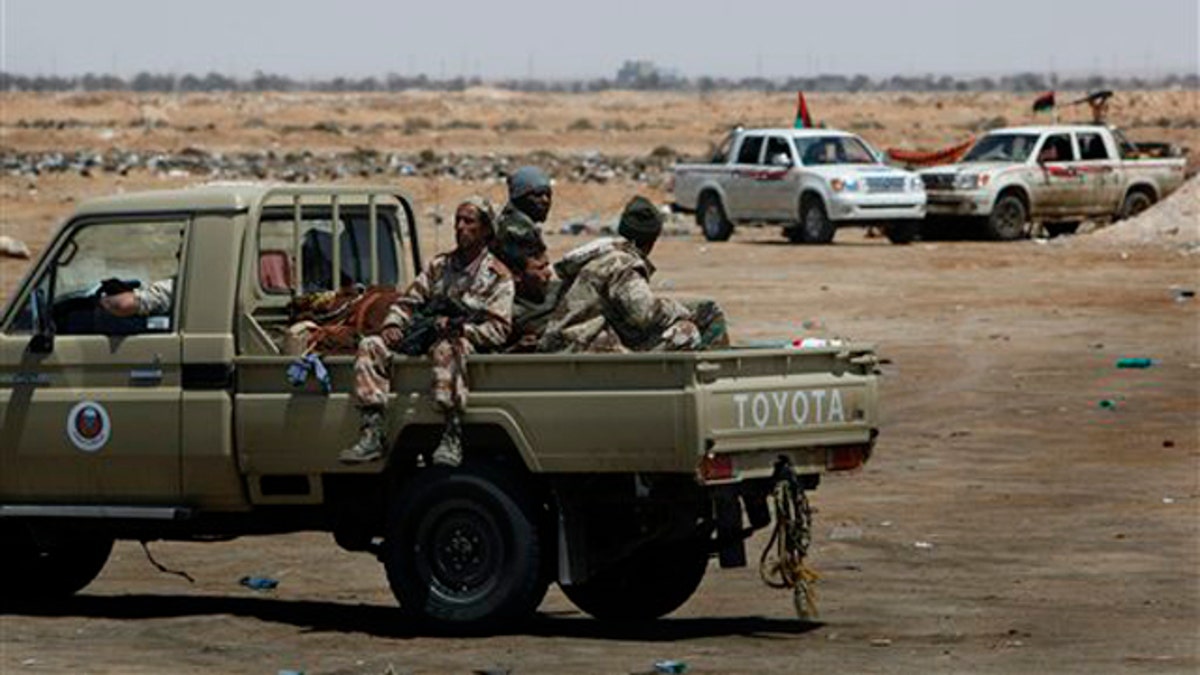
Libyan rebel fighters patrol along the western gate of Ajdabiya, Libya, April 23. (AP)
With fears mounting about a stalemate in Libya, the Obama administration is facing pressure from Congress to reclaim a lead role in the fight and take unprecedented measures to force Muammar al-Qaddafi from power.
The pressure is coming most prominently from a coterie of hawkish lawmakers, who are echoing concerns expressed by President Obama's top military advisers -- that with both sides digging in, the conflict could become a protracted struggle with no obvious exit for the United States.
The administration announced a significant policy shift Thursday, authorizing Predator drone strikes for urban areas in Libya. Some lawmakers want to see more. They are calling on the administration to formally recognize the Libyan opposition's transitional council, arm the rebels and unleash U.S. air power.
Sen. Lindsey Graham, R-S.C., urged a new level of allied involvement Sunday, calling for the U.S. and NATO to launch direct strikes on Qaddafi's inner circle in Tripoli.
"So my recommendation to NATO and the administration is to cut the head of the snake off, go to Tripoli, start bombing Qaddafi's inner circle, their compounds, their military headquarters in Tripoli," Graham said in an interview. "The way to get Qaddafi to leave is have his inner circle break and turn on him. And that's going to take a sustained effort through an air campaign. ... That's the quickest way to end this."
Graham expressed concern that the rebels, even if they become better armed, do not have enough momentum to advance to Tripoli and take on Qaddafi themselves. "The long drawn-out protracted engagement is not good for the Libyan people. A lot of people are going to die unnecessarily," he said.
Sen. John McCain, though, pushed back on the idea of an all-out air campaign on Tripoli to flush out Qaddafi.
"We have tried those things in the past with other dictators, and it's a little harder than you think it is," he said. "Qaddafi's a great survivor. We don't know exactly where he is. We do have to worry about civilian casualties. That could turn the Libyan people against us."
Rather, McCain said the U.S. would do better to sufficiently train and equip rebel forces, "which can either force Qaddafi out or obtain victory and send him to an international criminal court."
"My emphasis is on winning the battle on the ground, not taking a chance on taking him out with a lucky airstrike," McCain said. McCain is calling for stepped-up military support for the rebels after visiting their stronghold in eastern Libya Friday.
Like Graham, McCain suggested the U.S. military's AC-130 and A-10 aircraft should be employed, to support a Libyan rebel force that is "badly outgunned." He praised the Obama administration for authorizing Predator drones, but said, "I really fear a stalemate."
McCain and Graham spoke on CNN's "State of the Union."
McCain has also repeatedly called for all nations to recognize the legitimacy of the rebels' Transitional National Council, a call supported Sunday by Sen. Mark Kirk, R-Ill. Kirk called for a swift resolution to the conflict, with the assistance of U.S. air power.
"Now that the U.S. military and our NATO allies are involved, we have a responsibility to win," he said. "I think we should wrap this up."
But other lawmakers tempered calls for a stepped-up military campaign, urging colleagues to give the current operation ample time.
"We need to give it a little bit of time. I think the squeeze play that we are applying, more and more pressure to Qaddafi with military action with an embargo, will eventually succeed," Sen. Chris Coons, D-Del., said Sunday, speaking alongside Kirk on CBS' "Face the Nation."
Sen. Richard Blumenthal, D-Conn., suggested the U.S. should be "cautious" about vouching for a rebel government in Libya.
The nature of the mission itself has led to confusion and bickering in Washington since its inception in March. The U.N. resolution authorizing intervention and the establishment of a no-fly zone specified that the purpose was to prevent civilian casualties. Obama has said that U.S. policy, separately, is that Qaddafi should relinquish power.
While some call for increased military intervention, the nation is already weary from the wars in Afghanistan and Iraq. The decision to authorize drone strikes in Libya also creates the risk that the policy could cause a turn in public opinion against the U.S., as it has in Pakistan.
Adm. Mike Mullen, chairman of the joint chiefs of staff, gave a grim assessment Friday, saying that while Qaddafi's ground force capabilities have been significantly degraded, the conflict is "moving toward a stalemate."
He called the situation in eastern cities like Brega and Ajdabiya "very much stalemate-like," while reinforcing the need for Qaddafi to go.
Retired Gen. Jack Keane told Fox News on Sunday that the administration should employ "all the elements of national power" to achieve Qaddafi's ouster. He, too, suggested bringing U.S. air power "back in the fight."
"We can make a difference," he said.




